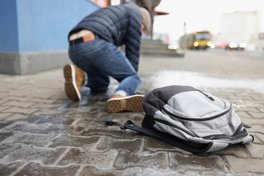How do I know who’s at fault for the accident?
Generally, whoever manages the public space, whether it’s a local authority or someone else, they must take steps to keep the public safe when they’re accessing it. But the word “reasonable” is crucial in determining whether or not you have grounds to claim compensation. For example, it’s not reasonable to expect a council to grit every single road or pavement in their borough, which is why they list priority locations.
Also, the ice may have just formed at the time of your accident, and the organisation may not have had a chance to take preventative measures, clear the site of ice or put up warning signs.
At Simpson Millar, we’re here to help you by determining whether the authority, organisation, employer or business were at fault due to not making the environment safe in ice and snow. If they failed to keep the area safe, they could be liable for your accident.
That’s why we’d strongly urge you to contact our Serious Injury Solicitors if you believe negligence led to your accident. We will listen to your story and what happened to you, and based on this, we can help you work out whether you have a claim, and we can let you know what we think your chances of success could be.
What are the different types of accidents in a public place?
- Pavements
- Roads
- Driveways, paths or steps at privately owned properties
- Car parks at supermarkets, shopping centres and at work
- School playgrounds
- Hospital grounds and car parks
- Work premises
- Decking and other wooden surfaces.
In detail: falling down the Stairs
Falling down stairs is sadly a common occurrence. When this happens, it can cause a variety of different issues and injuries, ranging in severity. Whilst some people may have minor injuries, others could be hurt more seriously. So, you might be wondering, in what circumstances can you claim for compensation?
Essentially, someone must be at fault in some way for your accident, be that a person or a company that has been negligent. For example, if you’ve fallen in a public space like a park, a shop or in the theatre, you’ll generally be able to claim against whoever owns this space.
In addition, you can claim compensation against a local or housing authority if you’ve fallen down the stairs on a property belonging to the authority. You can also claim against a home owner if you’ve fallen down the stairs whilst visiting them.
The important thing to remember is, whoever runs the business in the public place where you have an accident, it’s generally their responsibility to ensure you’re safe when you’re visiting them. So, it follows, if they don’t maintain their stairs, they’re putting you at risk of falling down them.
Common reasons for falling down stairs include:
- the lighting in the stairwell was too dim
- the stairs were wet and no warning signs were displayed
- worn carpets
- the handrails were loose or not present at all
- loose edging strip on the stairs
- a hole or defect in the surface of concrete steps
- ice on steps which have not been gritted
It’s important to keep in mind that these stairs don’t have to be inside a building. In fact, several different types of public spaces have outside stairs. If you’ve fallen on a set of stairs outside, leading to you sustaining an injury, you can still claim compensation against whoever is responsible for the area.
How Common are Falls on Stairs?
The Royal Society for the Prevention of Accidents has stated that more than 700 people per year sadly pass away after falling down the stairs, and more than 43,000 sustain some type of injury when falling down the stairs.
The most common injuries people sustain when they fall down the stairs are as follows:
- broken bones and fractures
- sprains
- neck Injuries
- damage to the face, head and back
Sadly, elderly people are more vulnerable and susceptible to sustaining more serious injuries on falls down the stairs which can result in more serious fractures particularly if you have thinning of the bones. In addition, falling down the stairs can have a massive psychological impact, especially on elderly people. It can knock people’s confidence, resulting in significant care needs depending on the severity of the injury and the psychological effects. You can claim compensation for these emotional effects and the extra care and assistance needed due to the fall.
In detail: Potholes in the road
Cycling UK has reported that 156 Local Authorities spend a total of £43.3 million on pothole claims.
There are a few groups who are responsible for maintaining high-quality and good-standard public roads. These are your Council, the Local Authority and the Highways Agency. The Highways Agency each year spends approximately £900 million ensuring that the roads they are responsible for are in a fit state to be used by the public. However, many people still trip and fall due to a pothole in the road. In addition, a road can quite easily become cracked and chipped, especially in the event of extreme weather.
Unfortunately, water can get into these holes, and this can then begin to freeze and thaw with time, then turning into potholes. If a pothole on the road is very big, whoever is responsible for this section of road should try and repair it as soon as they become aware, or they should at least try to maintain it until it can be completely repaired. If it’s smaller, however, the pothole might be left until the authority or council schedules in maintenance to deal with it.
Who is Responsible for the Pothole?
If you suffered an injury on a "trunk road" then these will usually be maintained by the Highways Agency, who are part of the Department for Transport. A trunk road is usually a main road.
Essentially, your Local Council are there to repair and maintain the road, and they get money from the government to do exactly this. You’re able to report a pothole to your Local Council to ask them to repair it. This can usually be done through the council’s website.
If you fell in a pothole on a road that’s private or one that isn’t maintained by the Local Authority, it means that, whoever owns the road or the properties, they may be responsible for the maintenance of the same.
What evidence is needed for a public place accident?
If you have, for instance, tripped over a piece of defective concrete in the road or pavement, our Personal Injury Solicitors could argue on your behalf that this was a hazard that was foreseeable and had the potential to cause injury to anyone walking or passing through the area. In this situation, your Local Authority may be held liable because, under Section 41 of the Highways Act 1980, defects such as potholes are the responsibility of whoever the relevant highway authority is.
This highway authority are obligated to uphold regular and high-quality inspections and maintenance, in order to keep the public as safe as possible.
Therefore, if you’ve been injured or been in an accident due to a hazard that was foreseeable, it may be because the highway authority didn’t meet their obligations, making them negligent.
However, a Local Authority or the owner of a public place could deny liability, in which case your claim will require further investigation. Carrying out the below can help support and evidence your claim:
- Obtain details of anyone who may have witnessed your accident and/or witnesses who can comment on how long the defect has been in that particular state
- Take clear photographs of the defect, making sure they are taken alongside a ruler (if possible) so that the height or depth is easily visible. Note down on the photograph the direction you were travelling and where the point of impact was.
- Take photographs of the surrounding area, showing easily identifiable landmarks and street names
Report the accident to the Local Authority or owner of the public building responsible
- Get medical advice immediately if you have sustained an injury and report the details as to how the accident happened to the hospital/GP to ensure it is recorded
Do you need a solicitor?
Known as “Public Liability claims”, these cases can be notoriously difficult and are often rejected by some law firms for this reason. But with the above information, you shouldbe able to present clear, objective evidence which can support your claim.
This can be a decisive part of a public liability claim. It’s essential to show, beyond doubt, that the other party failed to meet their legal duties to protect the public when they’re passing through this public place.
At Simpson Millar, our Personal Injury team aim to take some of the pressure away from you so that you can concentrate on rehabilitation and spending time with the people that matter to you.
We can offer you a free initial consultation. Here, we will listen to the details of your situation and your case, and based on this, we can walk you through how we can help you.
If we decide to take on your case, you’ll be assigned a solicitor on our team. They will take you through the whole claims process, keeping you updated and providing help and advice at every stage.
When we discover the identity of who is responsible for your accident, we’ll contact them and see if they arewilling to admit responsibility, and we’ll begin collecting evidence to support your claim for compensation.
If the other party admits liability, we will see if you can apply for interim payments, as these will help you deal with any immediate costs like care and other costs that cannotwait until your claim has been settled.
Our Personal Injury Solicitors have a proven track record of successfully dealing with public liability claims throughout England and Wales.
How long will it take to settle a claim?
When you’re looking to make a claim for compensation, it has to be within three years of the date of the accident, if you were an adult when it happened.
If the accident happened as a child, irrespective of the accident date, you have 3 years from the date you turn age 18 to bring a claim.
Are there any time limits?
As mentioned above, you have three years from the date of your accident to make your claim – however, we’d recommend that you talk to a legal specialist as soon as possible, because this makes it easier for you to gather the evidence you’ll need for your claim. This includes CCTV footage, witness statements and photos.
A Step-By-Step Guide to the Claims Process
Here at Simpson Millar, we want to make sure that your claim is as smooth and efficient as possible, from the very moment you get in touch with us. To achieve this, our friendly team will begin by offering you a free and confidential consultation, to better understand your injuries or the illness you’ve sustained.
When we’ve had this discussion, we’ll be able to guide you as to what the best course of action is when it comes to claiming compensation. We’ll take you through any steps we can take right now to meet your needs. We will communicate with the other party on your behalf, to help determine the issue of liability for their part in your accident.
If they admit liability, we will make efforts to obtain interim payments to cover the costs of urgent medical treatment, rehabilitation, and other related expenses while your claim is in progress.
Our objective is to make the entire process as informative and straightforward as possible for you.
How is injury compensation calculated?
When you’re claiming compensation for the injuries sustained, you might feel intimidated about calculating the amount you’re entitled to. However, this is all in our hands – and they’re very safe ones.
The amount of compensation you can claim for can be broken down into two components.
Firstly, there are general damages. This is for the suffering, pain and the impact the incident has had on your quality of life. This is also known as PSLA (which stands for pain, suffering and loss of amenity).
Secondly, there are special damages. These cover the financial setbacks and other expenses you’ve had to deal with due to your injury and accident, like medical bills and a loss of earnings.
We’re here to expertly and carefully consider and combine these two types of damages into your claim, and we’ll use these to determine how much compensation you should claim for. We want to make sure that you get the right and fair amount of compensation to cover the consequences of your accident and injury or injuries.
How Much Could I Claim for a Personal Injury?
As you’d Imagine, every claim for compensation is different, and everything depends on the particular circumstances of your case.
There are a few things that could affect how much personal injury compensation you get. These include:
- The severity of your injuries or illness
- If you need ongoing care or adaptations to your home
- If you need rehabilitation or physiotherapy
- How much you lost in earnings due to your injuries
- If you are partly responsible for your injuries
In the UK, there are some helpful guidelines which lay out how much personal injury compensation you could be awarded – these are set out by the Judicial College, and they take into account several different types of injuries.
These guidelines, combined with the specific details and circumstances around your case, gives us a good idea of how much you can expect to get.
However, it’s important to note that this is just an estimate.
No matter the nature of your claim, please rest assured that you're in capable hands. Our expert negotiators have secured hundreds of millions of pounds in compensation for our clients over the years. Some of our successful cases include:
If you have been involved in an accident similar to this or have any questions about an injury you have suffered, get in touch with a member of the Personal Injury team today on 0800 260 5010. Let us, help you.









